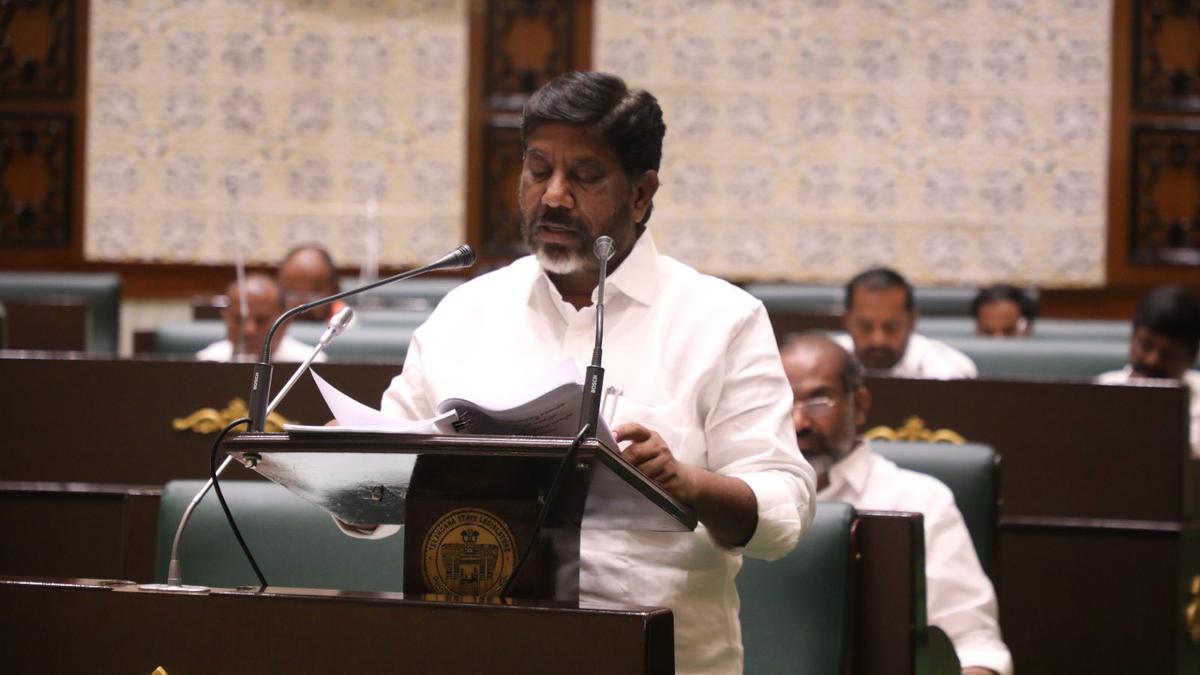Deputy Chief Minister and Finance Minister Bhatti Vikramarka Mallu presents the vote on account for 2024-25 in Telangana Assembly on February 10, 2024. | Photo: Special Arrangement
The Telangana government is facing an arduous task in fulfilling the six guarantees that the Congress promised before being voted to power, thanks to the slow pace of growth in revenue receipts.
The government has been struggling to raise resources for meeting its immediate commitments including payment of salaries, pensions, and interests. The seriousness of the situation can be gauged from the fact that close to half the revenue receipts are being spent on these three heads alone, according to the provisional figures released by the Comptroller and Auditor General of India (CAG).
While tax revenue for the current fiscal is projected at ₹1.52 lakh crore in the budget estimates, expenditure on account of salaries/wages (₹38,627 crore), pensions (₹13,024 crore), and interest payments (₹22,407 crore) account for ₹74,058 crore. This is in addition to subsidies, which amount to ₹12,958 crore. The CAG figures show that the State’s overall revenue receipts at the end of February stood at ₹1.51 lakh crore, 70.16% of ₹2.16 lakh crore of the budget estimates, with just a month left for the conclusion of the financial year.
In this backdrop, the implementation of the six guarantees is likely to be a Herculean task for the new government. The guarantees announced in the run-up to the Assembly elections include free bus travel for women across the State, enhancement of health coverage under YSR Aarogya Sri from ₹5 lakh to ₹10 lakh, supply of LPG cylinder at ₹500, free power up to 200 units to eligible households under the Gruha Jyoti scheme, houses to the poor under the Indiramma scheme, and a sustenance allowance for women.
The State started implementing free bus travel for which it needs to reimburse more than ₹300 crore a month to the State Road Transport Corporation. It has started enhancing the health coverage limit as well. The government made a provision of ₹53,196 crore in the ₹2.75 lakh crore vote-on-account budget for 2024-25, for the implementation of the six guarantees. The budget saw no hikes in taxes and duties in any form. The government made a provision of ₹2,418 crore for Gruha Jyoti for the next fiscal. This takes the total allocation to Transco and distribution companies to ₹16,825 crore as the government affirmed its commitment to implement 24X7 free power supply to farmers. The government allocated ₹7,740 crore for the Indiramma housing scheme. It decided to sanction 3,500 houses to each of the 119 Assembly constituencies in the State. The actual burden on the exchequer on account of implementation of the six guarantees is yet to be ascertained.
Also read | Telangana government gets some relief as Finance Ministry gives nod for ₹9,000 crore borrowings in Q4
Though the government is keen to implement its guarantees, the mismatch in the budget estimates and the actual estimates over consecutive years raises doubts over the availability of the resources towards this end. The overall revenue receipts till February end remained ₹1.51 lakh crore against the ₹2.16 lakh crore projected in 2023-24. Of this, ₹41,448 crore was in the form of borrowings and other liabilities.
Another area where excess projection is leading to shortfall in the actuals is grants in aid and contributions from the Central government. While the government estimated ₹41,259 crore revenue under the head for the fiscal, the actual realisation till the end of February remained at just ₹6,955 crore.

Telangana Deputy Chief Minister Mallu Bhatti Vikramarka admitted that the gap between the estimates and actuals for the current fiscal could be as high as ₹70,000 crore. Substantiating his claim is the huge difference between the budget estimates and actuals at the end of February.
Coupled with these are the restrictions imposed by the Union Finance Ministry on the State’s market borrowings citing financial management. But these have been relaxed to some extent after Chief Minister A. Revanth Reddy and Mr. Bhatti Vikramarka met Prime Minister Narendra Modi and Union Finance Minister Nirmala Sitharaman in January.
Also read | Telangana trails in health spending, reveals CAG report
The State needs to explore new avenues to augment its resources and not just depend on revenue through excise and sale land parcels. In addition, it should also focus on areas where there are said to be leakages. These cause dents to the government revenue and need to be fixed so that Telangana can can deal with challenges on the financial front.

